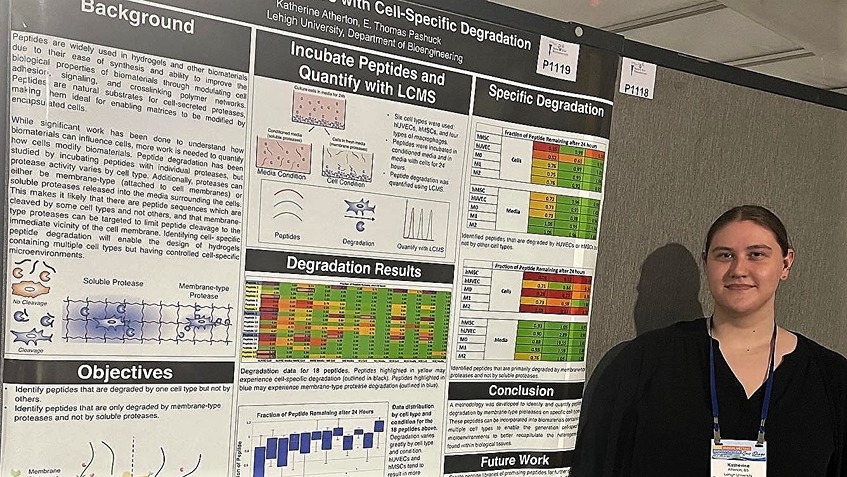
As a Clare Boothe Luce Research Scholar, Katie Atherton ’25 works with hydrogels, identifying how different gels and proteins influence cell health and responsiveness.
“Before most people come to college for engineering, they don’t really know what engineers actually do,” Atherton says. “This research is a great way to figure out what I like.”
The chemical engineering major is learning the ropes in a biomaterials lab led by Tommy Pashuck, an assistant professor of bioengineering. The Pashuck Lab designs hydrogels for modeling tissue and disease, investigating material interactions, and other tissue engineering and regenerative medicine applications.
In April, Atherton was able to present her work on peptides, a key component in the Pashuck lab's hydrogels, at the Society for Biomaterials Conference in San Diego—an accomplishment that she says would make her high-school self proud.
Before coming to Lehigh, Atherton says, she wasn’t aware that conducting research as an undergraduate would be an attainable goal.
The Clare Boothe Luce (CBL) Research Scholarship enables high-achieving undergraduate women in engineering to conduct research, with faculty guidance and mentoring, during the academic year as well as over the summer. The program, which is funded by a grant from the Henry Luce Foundation, provides financial support for up to two years. At Lehigh, CBL scholars also take part in community outreach, serving as mentors in the Rossin College's CHOICES camp, and present their work at the college's David and Lorraine Freed Undergraduate Research Symposium.
The scholarship has helped Atherton move past hurdles that might have held her back from the experience, namely time and money. Getting paid to do research over the summer was a win-win situation, she says.
The program has also helped her build connections. She enjoys spending time with the other students working in the lab and learning from them.
“The graduate students have always been super great at being able to walk me through any issues and teach me how I can go about fixing them,” she says. “They've recently been through what I'm going through, and they're not so disconnected from the experience of being a confused newbie in a lab.”
If she hadn’t applied for the CBL scholarship, Atherton believes her Lehigh experience would have been immensely different. She considers the program to have given her a jump start on the path to a professional career in biomolecular engineering.
Over the summer, Atherton will continue to explore hydrogels as an intern at the University of Bordeaux in France through another experiential learning opportunity Lehigh offers, the Iacocca International Internship program.
She urges fellow undergraduate students who aren’t sure how to get involved in research or find out if it piques their interest to simply ask questions of their professors.
“Just talking with them about their work can give you insight into potential research projects and opportunities,” she says.
—Kate Turkeltaub ’23 is a student writer for the P.C. Rossin College of Engineering and Applied Science
